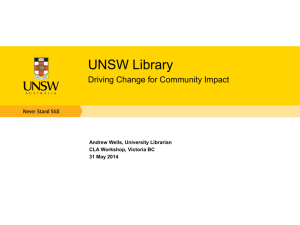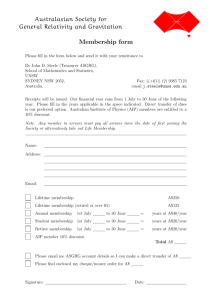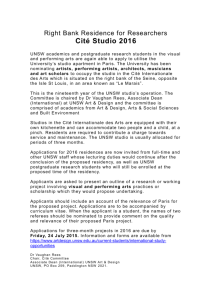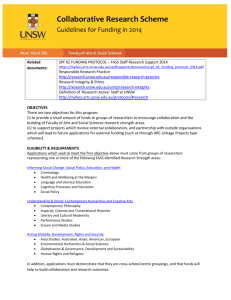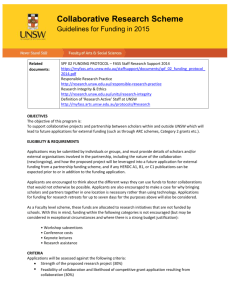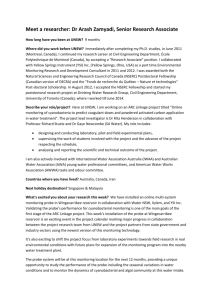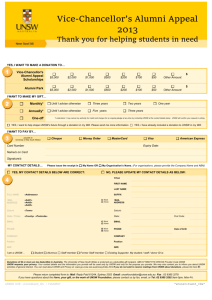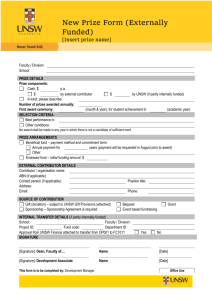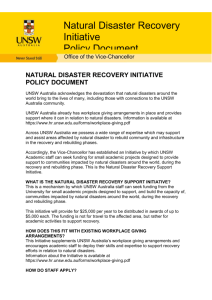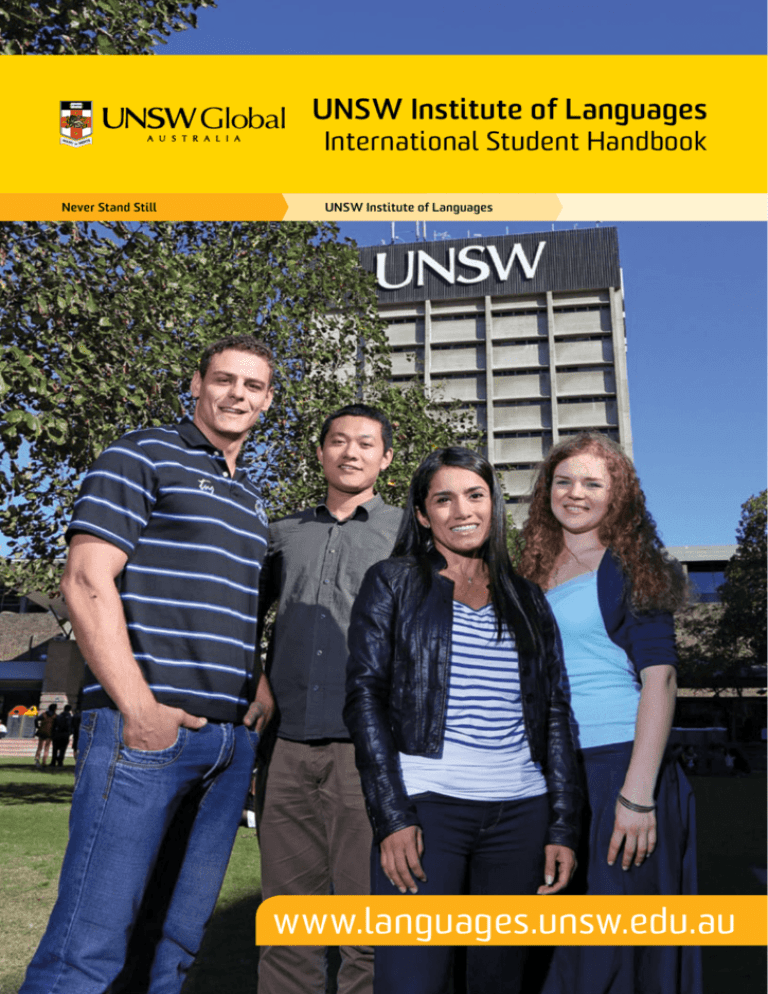
UNSW Institute of Languages
International Student Handbook
Never Stand Still
UNSW Institute of Languages
www.languages.unsw.edu.au
Contact Details
Postal Address:
UNSW Institute of Languages
International Student Handbook
UNSW Institute of Languages
PO Box 853
Kensington 1465
Kensington Campus
UNSW Building L5
223 Anzac Parade
Kensington NSW
Telephone 9385 5396
Fax
9662 2651
Email
admissions@unswglobal.unsw.edu.au
Randwick Campus
UNSW Building R14
22-32 King Street
Randwick NSW
Telephone 61 2 9385 0374 or 61 2 9385 0375
Fax
9399 5420
Email
institute.languages@unsw.edu.au
Website
Copyright © 2014
Edition: November 2014
www.languages.unsw.edu.au
Reception Hours
Monday to Friday 8.30am to 5.30pm at Kensington
Monday to Friday 9.00am to 5.00pm at Randwick
All rights reserved. Except under the Conditions
described in the Copyright Act 1968 of Australia
and subsequent amendments.
REGISTERED PROVIDERS
UNSW Global Pty Limited
CRICOS Provider Code: 01020K
This publication may not be reproduced, in part or
whole, without the permission of the copyright owner.
UNSW Global Pty Limited
ABN 62 086 418 582
This publication is revised periodically.
Welcome
Welcome to the Institute of Languages at the University of New South Wales.
The Institute of Languages was established in1966 and since then many
thousands of international students have studied with us and either gone on to
further study in Australia or returned home with new skills and understanding.
We have also helped many thousands of newly arrived migrants to improve
their English and settle successfully in Australia.
In addition to teaching English, the Institute of Languages offers courses in a
variety of foreign languages and courses for people who wish to become
language teachers. The Institute of Languages is also an official test centre for
IELTS and TOEFL as well as a number of specialised language tests.
Altogether, no other language centre in Australia offers as extensive a range of courses as the
Institute of Languages.
The teachers at the Institute of Languages are dedicated professionals who will assist students to
achieve their learning goals as quickly and effectively as possible. The teachers at the Institute of
Languages use contemporary language teaching methodology, well designed courses and modern
educational technology to provide the best possible learning experience for students.
The Institute of Languages also provides a range of support services for students including
resources to promote independent learning, academic and welfare counselling, an accommodation
service, an activities and social program, and access to the various facilities at UNSW.
We value our students and take pride in assisting them to achieve their goals. We aim for
excellence and appreciate feedback which will help us to continually improve our courses and
services.
On behalf of the staff of the Institute of Languages, I wish all of our students a happy and
productive learning experience here at the Institute.
Mr Marc Weedon-Newstead
Principal and Group Executive
UNSW Institute of Languages
Contents___________________________
Section 1: Course Information
Class Times .......................................................................................................................... 5
Term Dates ........................................................................................................................... 5
Course Level Chart ............................................................................................................... 6
Level Guides ......................................................................................................................... 7
Learning Outcomes ............................................................................................................... 8
Assessment .......................................................................................................................... 10
Certificates ............................................................................................................................ 10
Teaching and Learning ......................................................................................................... 10
English Test Information ....................................................................................................... 11
Section 2: Rules and Procedures
Attendance and Visa Rules ................................................................................................... 12
Student Conduct Policy ......................................................................................................... 14
Course progress ................................................................................................................... 15
Academic English Assessment Rules ................................................................................... 16
Information Technology Rules............................................................................................... 18
Complaints and Appeals ....................................................................................................... 19
Section 3: People at UNSWIL ...................................................................................... 21
Section 4: Facilities and Services
Learning Support Units (LSU) ............................................................................................... 22
Internet Access and WiFi ...................................................................................................... 22
Access to Computer Labs ..................................................................................................... 22
Student Intranet .................................................................................................................... 22
Notebook / Laptop usage ...................................................................................................... 22
Printing and Copying Facilities .............................................................................................. 23
Language Laboratory ............................................................................................................ 23
Disabled Access ................................................................................................................... 23
Shuttle Bus Service ............................................................................................................... 23
Café ...................................................................................................................................... 23
Student Support/Student Advisers ........................................................................................ 24
Students Under 18 Years of Age (U18) ................................................................................. 25
Student Services on UNSW Campus .................................................................................... 26
UNSW Undergraduate and Postgraduate Courses ............................................................... 26
UNSW International .............................................................................................................. 26
UNSW Student Development Internationals ......................................................................... 26
Library Facilities .................................................................................................................... 26
Medical Services ................................................................................................................... 26
Religious Groups at UNSW ................................................................................................... 26
Sports Clubs ......................................................................................................................... 26
University Gymnasium & Sporting Facilities .......................................................................... 26
Arc ........................................................................................................................................ 26
Section 5: Emergencies, Security, Health and Safety, Contacts & Maps
Emergencies on Campus ...................................................................................................... 27
UNSW Security ..................................................................................................................... 27
Personal Safety ..................................................................................................................... 28
Where to find UNSWIL Facilities ........................................................................................... 30
Contacts................................................................................................................................ 30
UNSWIL Campus Map .......................................................................................................... 31
UNSW Campus Map ............................................................................................................. 32
UNSW Institute of Languages - International Student Handbook | Page 3
Page 4 | UNSW Institute of Languages - International Student Handbook
1. Course Information
Class Times
Morning Session
9.00am to 11.00 am
Break
11.30am to 1.30pm
OR
Afternoon Session
1.30pm to 3.30pm
Break
4.00pm to 6.00pm
Sample Timetable: Please note – Your classes may be in the morning or afternoon
Term Dates 2015
Term
1
2
3
4
5
6
7
8
9
10
2015 Dates
5 Jan – 6 Feb
9 Feb – 13 Mar
16 Mar – 17 Apr
20 Apr – 22 May
25 May – 26 Jun
29 Jun – 31 July
3 Aug – 4 Sep
7 Sep – 9 Oct
12 Oct – 13 Nov
16 Nov – 18 Dec
UNSW Institute of Languages - International Student Handbook | Page 5
Course Level Chart
Page 6 | UNSW Institute of Languages - International Student Handbook
Level Guides
General English (GE) and English for Business Communication (EBC)
The Institute of Languages offers General Proficiency English at all levels from Beginners to Advanced as
well as a number of special interest courses.
You will normally move to the next level after completing a course (10, 15 or 20 weeks). Your course will
depend on the result of your placement test on arrival at UNSWIL. Minimum English requirements apply to
each level of English course.
Level
1
Elementary
2
Pre-Intermediate
3
Intermediate
4
Upper Intermediate
5
Pre-Advanced
6
Advanced
AEBC Advanced Business
*Common European Framework of Reference
Duration
10 weeks
10 weeks
10 weeks
10 weeks
15 weeks
15 weeks
20 weeks
CEFR* equivalent
A1
A2
B1
B2
B2+
C1
B2+/ C1
Academic English (AE)
The Institute of Languages offers Academic English for Lower Intermediate to Advanced levels for students
intending to enrol in UNSW and other universities, University Foundation Studies or other tertiary courses.
Students who do not have an IELTS, TOEFL or PTE test score (within the last 12 months) can sit for the
UNSWIL placement test on arrival.
Entry scores to AE courses and progress requirements
(All courses are 10 weeks unless otherwise stated)
UNSWIL:
Course placement
AE Courses
Academic English Level 1
Foundation English Entry
Course (FEEC)
Academic English Level 2
AE Initial class placement
IELTS band
on entry
(overall)
4.5
IELTS Writing
score on entry
AE Progress requirements
4.5
UNSWIL - AE
Grade on entry
(overall)
E+
UNSWIL - AE
Writing grade
on entry
D-
5.0
4.5
D
D-
5.0
5.0
D
D-
University English Entry
Course (UEEC 20-20 weeks)
University English Entry
Course (UEEC15-15 weeks)
University English Entry
Course (UEEC10-10 weeks)
IELTS Test Preparation
5.5
5.5
D+
D+
6.0
5.5
C
D+
6.0
6.0
C
C-
5.5
5.5
D+
D+
Tertiary Orientation Program
(TOP) 5 WEEKS
6.5 +
(Full offer for
UNSW)
6.0+
(in all
modules)
Full offer for
UNSW or
C+ from UEEC
Full offer for
UNSW or 20/30
from UEEC
You can find further information on our website at: www.languages.unsw.edu.au
UNSW Institute of Languages - International Student Handbook | Page 7
Learning Outcomes
General English Outcomes
Course
Level
Level 1
Elementary
Level 2
Pre
Intermediate
Level 3
Intermediate
Level 4
Upper
Intermediate
Level 5
PreAdvanced
Level 6
Advanced
Outcome
Basic competence in English for immediate survival
purposes. Can understand some main points of very clear
standard input on familiar matters and topics and
communicate with limited confidence in his/her known
areas. May frequently experience problems in accuracy
and fluency when understanding and communicating
messages.
Competence in English for survival purposes. Can
understand the main points of clear standard input and
communicate his/her opinions or needs with some
confidence on familiar matters and topics. Can write short
simple texts related to personal information.
Can converse confidently about experiences and opinions
on a range of topics and deliver meaning clearly, though
with some grammatical inaccuracy.Can comprehend
specific information in a variety of formats if articulated
clearly and can obtain meaning from reading texts such as
short magazine and newspaper articles, using a range of
strategies to assist comprehension. Can structure writing
well, and shows awareness of the features of distinct
genres, such as narrative, letter and description.
Can express views and engage in debate on more
complex topics, as well as present information formally,
utilizing some specialised vocabulary and increasing
grammatical accuracy. Can cope with a variety of accents
and some use of colloquialisms. Uses strategies such as
inferring meaning from context to comprehend longer and
more involved texts on a variety of subjects. Can produce
a range of writing texts, demonstrating increased control of
register and more complex sentence structures.
Has a reasonable command of quite complex English,
expressing him/herself with some fluency, and able to
cope with new elements when speaking with native
speakers. Can produce a variety of organized and detailed
written texts, appropriate to the context. Can grasp the gist
of both abstract and concrete reading texts.
Has reached the level of fluency in both writing and
speaking, and can use the language spontaneously and
with flexibility, making only minimal errors in general and
professional contexts. Understands and can apply the
appropriate level of formality of language in different
contexts, enabling quite comfortable interaction with native
speakers at normal speed. Can understand complex
abstract and technical texts.
CEFR *
Equivalence
A1
A2
B1
B2
B2+
C1
*Common European Framework of Reference for Languages: Learning Teaching, Assessment. The above levels are of
approximate equivalence to the CEFR Common Reference Level Global Scale bands specified.
Page 8 | UNSW Institute of Languages - International Student Handbook
Academic English Outcomes
Course
Level
Outcome
CEFR *
Academic
English 1
(AE1)
Intermediate
Academic
English 2
(AE2)
Foundation
English Entry
Course
(FEEC)
Upper
Intermediate
University
English Entry
Course
(UEEC)
Advanced
Tertiary
Orientation
Program (TOP)
Advanced
Can develop and use independent learning strategies. Can
understand simple spoken text across academic style genres
including: lectures (approx. 5–7 min duration), discussions and
media broadcasts (approx. 5 – 7 min). Can prepare and deliver a
formal group spoken presentation on an academic topic. Can
read written and graphical information from adapted/ simplified
academic style texts (approximately 500 words). Can produce
explanation texts at the extended paragraph level (150 – 200
words) under exam conditions.
Can develop and use effective independent learning strategies.
Can understand standard spoken text across academic genres
including: lectures (approximately 10 min duration) and media
broadcasts (approximately 10 min duration). Can prepare and
deliver formal spoken presentations on various academic topics.
Can read written and graphical information from adapted
academic style texts (approximately 900words). Can effectively
produce explanation genre essays (200 – 300 words)
Can develop and use independent learning strategies. Can
undertake library /internet / database searches to locate a wide
range of academic texts. Can understand complex spoken text
across a variety of academic genres as required at the minimum
tertiary entry level including authentic: lectures (approximately
15 – 20min duration), discussions and media broadcasts
approximately 15 – 20min duration). Can prepare and deliver
formal discipline specific spoken presentations and effectively
engage in tutorial style discussions on a topic of an academic
nature (discipline specific). Can read written and graph
information from authentic tertiary level academic texts
(approximately 2500 words). Can produce complex expository /
discussion / explanation genre long essays(300 – 1500 words)
Can develop and use independent learning strategies. Can
undertake library /internet / database searches to locate a wide
range of academic texts. Can understand spoken text across a
variety of academic genres as required at the tertiary entry level
including authentic: lectures (approximately 15 – 20+min
duration), discussions, media broadcasts (approximately 15 –
20+min duration). Can prepare and deliver formal spoken
presentations on a topic of an academic nature (discipline
specific). Can read written and graphical information from
authentic tertiary level academic texts (approximately 2500
words). Can produce complex expository / discussion genre
essays and reports.
Equivalence
B2
B2
C1
C1
*Common European Framework of Reference for Languages: Learning Teaching, Assessment. The above levels are of
approximate equivalence to the CEFR Common Reference Level Global Scale bands specified
UNSW Institute of Languages - International Student Handbook | Page 9
Assessment
The UNSW Institute of Languages is committed to enabling and assisting you to reach your study goals. For
more detail about Course Progress, see page 11. More detailed information about assessment for each
course is provided in the Course Outline on the first day of class.
Academic English
General English
Your final course mark is based on a range of
tasks:
Participation and performance in class
Homework and/or assignments
A presentation
Progress tests during the course
A test at the end of the course
Your final course mark is based on a range of
tasks:
Participation in class
A seminar presentation
In class writing tasks
Tests during and at the end of the course
Others as identified in the course
assessment
Certificates
Certificates are issued at the end of the final term of your studies with us. We cannot issue a certificate to
students whose attendance is less than 80% (or 90% for FEEC and UEEC).
Certificates will indicate the course(s) you have studied and the level of English proficiency you have
achieved.
Teaching and Learning
At the beginning of your course and when you move to a new level, you will receive a Course
Outline which includes the learning outcomes for your course and information about the course
assessment.
You will have 2 or more teachers for your classes. Senior Teachers are responsible for the
teaching program, course content and student progress. Your timetable includes contact information
for a Senior Teacher.
Depending on your course, your class may use a published textbook which students may buy or
borrow for the term from the LSU (Learning Support Unit) or UNSW Institute of Languages Course
booklets issued by your teachers.
Additional online learning resources are available for all students in Moodle (the learning
management system)
You may use the independent learning resources in the Learning Support Unit if you have any study
problems. Your class teachers, the Progress Senior Teacher or LSU staff will guide you to extra
learning materials on-line or from the LSU.
Page 10 | UNSW Institute of Languages - International Student Handbook
English Language Test Information
IELTS, TOEFL and Cambridge tests are all internationally recognised as valuable qualifications. You may
wish to enrol for one of the following tests at the Institute of Languages.
International English Language Testing System (IELTS)
UNSW Institute of Languages is an approved IELTS testing centre.
We offer students preparation for the IELTS test through our IELTS Test Preparation courses.The IELTS test
is a globally recognised English language proficiency assessment designed to assess the English language
ability of international candidates.
Test dates
Tests are normally offered on Saturdays, with some sessions on Thursdays. The Listening, Reading and
Writing tests are all taken on the same day. The Speaking test can take place up to seven days before or
after the other papers; speaking tests for Thursday tests will usually take place on the following Saturday. To
register for an IELTS test, you need to submit your application form onlineat least five weeks before the test
date.
Further information (dates, fees etc) is available on the UNSWIL website –
www.languages.unsw.edu.au/tests/ielts
Test of English as a Foreign Language (TOEFL)
The UNSW Institute of Languages administers the TOEFL test. The TOEFL tests we offer are internet-based
and these tests measure how well you read, listen, speak and write in English. You have to register online for
this test. The TOEFL website is www.ets.org
Cambridge ESOL Examinations
UNSW Institute of Languages is an authorised Cambridge ESOL computer based testing centre.
The following computer based exams are offered in 2012:
Certificate in Advanced English (CAE)
First Certificate in English (FCE)
Further information (dates, fees etc) is available on the UNSWIL website
www.languages.unsw.edu.au/tests/cambridge-english
UNSW Institute of Languages - International Student Handbook | Page 11
2. Rules and Procedures
Attendance and Visa Rules
If you are on a Student Visa, the Department of Immigration and Border Protection (DIBP) requires the
UNSW Institute of Languages to report on your attendance. Further information about DIBP visa
requirements can be found on www.international.unsw.edu.au/current/currentvisa.html
It is a condition of your visa that you attend at least 80% of all of your classes. If your attendance is less
than 80%, you may be reported to DIBP. In this situation you may have your enrolment and visa cancelled
and it is possible that you may be deported.
Teachers mark attendance in every lesson according to the following:
Marking Attendance
If a student is absent from the whole session for any reason: absent is marked (A) on the roll.
(2hrs= 2% absence for the term)
From 10-30 minutes late for a class session, at any time of the day: (L) = Late (4xL= 2%
absence)
More than 30 minutes late for a class session, at any time of the day: (A/L) (2xAL= 2%
absence)
Attendance is checked by the Senior Teachers every week.
Medical certificates
If you are sick you should make an appointment to see a doctor while you are sick and get a medical
certificate. Give a copy of your medical certificate to your Senior Teacher as soon as you return to
school. You should keep the original copy of the medical certificate.
Warning letters
If you are absent more than 5 days in any term without approval, or are close to a point where you
may not be able to reach 80% attendance even if you attend every class in the future, you will
receive a warning letter. If you receive a warning letter you must speak to the Student Adviser or
Head of Studies as soon as possible. You may show documentary evidence (eg. medical
certificates) to explain the reasons for any low attendance rate.
If your attendance does not improve, a second warning letter is sent.
If it is impossible to achieve 80% attendance, even if you attend class every day in the future, you
will be informed via an Intention to Report email that the matter will be reported to DIBP. You will be
given 20 working days to access UNSW Institute of Languages’ Complaints and Appeals process
(see page 20 of this handbook).
If your appeal is unsuccessful, DIBP is informed by UNSW Institute of Languages and your visa may
be cancelled. You should keep any original copies of medical certificates and these may be
considered by DIBP in deciding whether to cancel your student visa
Students who are reported to DIBP for unsatisfactory attendance may have their enrolment at
UNSW Institute of Languages cancelled or re-enrolment refused and may not be accepted for the
UNSW Foundation Studies Program.
Work Rights
Students on Student Visas are permitted to work up to 40 hours per fortnight.
Dependants (such as a apouse) may have permission to work, and the hours may vary. Please check the
visa conditions.
Page 12 | UNSW Institute of Languages - International Student Handbook
Tax File Number
Students can apply for a Tax File Number online at www.ato.gov.au. You will need your tax file number in
order to get a job.
Contact details
It is a DIBP requirement that you provide all contact details (address, telephone numbers etc) to UNSW
Institute of Languages when you enrol.
Change of Address
It is a DIBP requirement that you must notify UNSW Institute of Languages at least 2 days in advance of any
change to your residential address. You should provide this advice by logging on to the MyProfile section of
www.my.unswglobal.unsw.edu.au or by completing
a Change of Address Form, available from the Student Solutions Centre and the Student Intranet.
Changing Education Provider
Students must remain with the same education provider for the first six months of their principal course. If
you have a UNSW offer, your principal course is your UNSW course. Permission to change education
provider will only be given in exceptional circumstances. Please see the UNSW Global Transfer Between
Providers Policy and Procedure at http://www.unswglobal.unsw.edu.au/ESOS.html
Refund Policy
UNSW Institute of Languages will issue refunds as outlined in your Conditions of Enrolment . For a copy of
the conditions, please see www.unswglobal.unsw.edu.au/coen.pdf
Student Conduct
The UNSW Student Code policy applies to all
UNSW Institute of Languages students. All
students at enrolment must accept their shared
responsibility for maintaining a safe, harmonious
and tolerant environment in which to study and
work. The policy has been summarised below for
UNSW Institute of Languages non English
speaking background students. The full policy can
be found at:
https://www.gs.unsw.edu.au/policy/documents/stu
dentcodepolicy.pdf
Student Responsibilities
We ask you
to actively learn and study, attend classes
on time and inform the teacher when
absent
to complete all academic tasks honestly
i.e. not copying other work (more
information on plagiarism can be found
from the Learning Centrewww.lc.unsw.edu.au
to hand in homework tasks within the
agreed time limits
to be respectful and courteous to all staff
(both academic and administrative) and
other students
not to disturb classes by using mobile
phones or other electronic equipment e.g.
IPODs
not to swear, offend or threaten any other
student or staff member
not to enter class under the influence of
drugs or alcohol or supply drugs and
alcohol on the premises
to use and care for UNSWIL property and
equipment e.g. classrooms, the Language
& Computer Labs, the LSU in a
responsible manner
not to behave in a way that disturbs any
teaching activity at UNSW Institute of
Languages.
Student Rights
You have a right
to learn in a secure and supportive place
without prejudice or discrimination
to be given correct, reliable and timely
information about the course and
assessment tasks
to be given appropriate and helpful
feedback about your studies
to be given respect and to be fairly and
courteously treated by all staff members
to receive counselling and advice both
academic and personal, if necessary
to privacy about your personal situation
to have any complaints listened to and
managed quickly and fairly
to be informed about UNSWIL’s policies
and procedures (see the Student Intranet
for further information
UNSWIL Campus Policies
We ask you
not to eat or drink in the classroom,
computer/language labs or LSUs during
class or recess
not to smoke in or around the entrances
of Institute buildings
Page 14 | UNSW Institute of Languages - International Student Handbook
Course Progress
UNSW Institute of Languages is committed to
enabling and assisting students to reach their
study goals within the expected timeframe. The
progress of students is monitored, recorded and
reviewed at the end of each 10 week study period.
If your grades are not high enough to progress as
expected, the Progress Senior Teacher will
contact you and discuss issues such as the
reason for the course progress problem, study
habits, a study plan, extra tuition or other
strategies to improve your performance.
An intervention strategy may be put in place to
assist you in your progress.
The class teacher or Progress Senior Teacher
may refer you to online or LSU resources in order
to improve your study skills and focus on problem
issues.
If you have non-academic issues affecting your
progress, you may be referred to a Student
Support adviser for assistance.
include sessions with a Student Adviser, extra
homework or repeating a level.
You may need to repeat a level in order to
achieve the grades required to proceed to the
next course level.
If the your progress is unsatisfactory for two
consecutive 10 week study periods, despite
intervention, you will be informed in writing of
UNSW Institute of Languages’s intention to report
you to the Department of Immigration and Border
Protection. Students are able to access UNSWIL’s
Complaints and Appeals process within 20
working days.
UNSW Institute of Languages full Monitoring
Course Progress policy is available at
http://www.unswglobal.unsw.edu.au/documents/E
SOS_PDF_Files/IL-010POL_UNSW_Institute_of_Languages_Monitoring
_Course_Progress_Policy.pdf
A Learning Plan may be put in place and you will
need to agree to the plan in writing. This could
UNSW Institute of Languages - International Student Handbook | Page 15
Academic English Assessment Rules
Course assessment includes projects, tutorial
exercises, assignments, presentations or tests as
well as examinations. In this document the full
term "examinations and formal assessment tasks"
is abbreviated to "examinations".
You must not ask for or give, assistance
to any other candidate in the content of
the exam.e.g. answers
You must not submit memorised essay
content pre-prepared individually or in a
group. Your essay must be composed
during the examination
Examinations in all courses are conducted in
accordance with the following rules and
procedures:
You must obey any instruction given by an
examination supervisor for the proper conduct
of the examination.
You must make sure you are present at
all scheduled examinations.
You must present your student card and
passport at all examinations and leave this on
your desk for the duration of the examination.
Misreading the timetable is not an
acceptable excuse for lateness or failure
to attend.
You must make sure that you have
completed all the required forms of
assessment
Penalties will be applied for late
submission of assignments.
If you commit any infringement of the
rules governing examinations you may be
liable to disqualification at the particular
examination, to immediate expulsion from
the examination room and to further
penalty as may be determined by the
UEEC Academic Committee and/or the
Head of Studies for AE.
You must be seated in your allocated place in
the examination room not less than 15
minutes before the scheduled commencement
time.
If you arrive more than 30 minutes after the
scheduled commencement time you will not
be admitted to the examination room.
You may not leave your seat for any reason
without permission. If you do leave the
examination, you will not be re-admitted
unless, during the full period of your absence,
you have been under approved supervision.
All answers must be written in English unless
otherwise stated.
Student Misconduct and Academic
Misconduct
Authorised materials: you are permitted to
take pens, pencils, rulers and erasers into the
examination room but are advised that all
answers must be written in pen, except where
expressly required. Pencils may be used only
for multiple choice answer sheets, drawing,
sketching or graphical work.
You are reminded that UNSWIL regards
misconduct and academic misconduct as a very
serious matter. Students found guilty of serious
academic misconduct in UNSW Institute of
Languages courses can be excluded from future
courses.
Students who are excluded will not be issued with
a Statement of Results or an accredited
certificate. No portion of the fees will be refunded.
You may not bring any unauthorised
materials into the examination room.
Examples of unauthorised materials are:
bags, motor cycle helmets, hats or caps,
calculators, electronic dictionaries or word
finders, writing paper, notes, manuscripts
or books, pencil cases, mobile phones,
food or drink. Dictionaries are not
allowed during Academic English
examinations.
The following are some actions likely to result in a
charge of academic misconduct:
You are not permitted to smoke, eat or
drink during examinations.
Page 16 | UNSW Institute of Languages - International Student Handbook
submitting false information for an
enrolment
attempting to circumvent the security and
privacy features of the computer system
taking unauthorised materials into an
examination
allowing / arranging for another person to
take your place in an examination
The application should be made preferably on the
day of the examination, but no later than three
working days after the date of the
examination.
submitting work for assessment knowing
it to be the work of another person
failing to acknowledge the source of
material in an assignment, essay or
project
improperly obtaining prior knowledge of
an examination paper
You should include all supporting evidence, e.g.
medical certificates.
You are required to acknowledge the sources of
ideas and expressions used in submitted work. To
provide adequate documentation is not only an
indication of academic honesty but also a
courtesy enabling the marker to consult sources
with ease. Copies should be kept of original
references if they are referred to in your
assessment task.
Educational Adjustments
If your study is affected by a disability, you can
register for educational adjustments. Educational
adjustments vary depending on each case and
the documentation received from health
professionals. They may be educational
adjustments during class and/or exam periods .
To register for educational adjustments, the first
step is to make an appointment to see a Student
Adviser at the Student Solutions Centre or email
student.support@unswglobal.unsw.edu.au.
The application is noted, but no further
action taken; if you were absent from the
examination, a mark of zero, or an
unsatisfactory grade is given.
2.
Other assessment components are
re-weighted at the end of the course, to
arrive at a final grade.
Students may apply for a review of a result only
after they have received their final grade.
Students must submit an Application for Review of
Examination Grades form available from the
Student Solutions Centre. This application must
be accompanied by a fee, and received within one
week of the date of issue of the final grade.
This is a confidential service. The Student Adviser
and SEADU do not disclose your disability to
UNSW Institute of Languages. For more
information, go to
www.studentequity.unsw.edu.au
If you are unavoidably absent, or believe your
performance during an examination has been
adversely affected by sickness, serious family
concerns or any other reason, you should apply
for consideration via the form
Illness/Misadventure Affecting Assessment
which is available at the Student Solutions Centre
1.
Remarking and appeals process
The Student Adviser will help you to register with
the UNSW Student Equity and Disabilities Unit
(SEADU) who will make recommendations to the
Institute.
Illness/Misadventure affecting
assessment
In most cases one of the following actions is
taken:
If a student wishes to apply for a remark of their
grades, they need to indicate clearly which
assessment task they would like to have
remarked, and attach the original assessment
task (if possible) to the application form. The
remarking process takes two weeks, and if a
grade is changed, the application fee will be
refunded. In the event that a student remains
dissatisfied with the remarking process, they have
the right to lodge an appeal (see Complaints and
Appeals).
Conceded Pass
If you do not achieve an overall passing grade but
are deemed by the AE department to have a
satisfactory academic standard you may be
awarded a Pass Conceded. This allows you to
continue with your study program. A Pass
Conceded can only be awarded by an
Assessment Committee comprising the AE Head
of Studies and two AE Senior Teachers.
UNSW Institute of Languages - International Student Handbook | Page 17
Information Technology (IT) Rules
Most classes are timetabled each week into the
Computer Laboratory. Students may also access
computers in the LSU and other computer
laboratories in L5 outside class hours. See below
and following pages for information and policy
about information technology resources.
It is important that you do not
give your password to another person
use passwords which you are not
authorised to have
use another person’s identification when
signing onto an UNSWIL computer or
network
download, copy or store copyrighted
material such as music, video or move
files
excessively download non-academic
material or material not related to the
current course.
copy or load software of any kind onto
UNSWIL owned computers
access, store or display pornographic or
paedophilic material
attach any devices to the UNSWIL
computer network without authorisation
leave your workstation unattended while
logged on to the UNSWIL computer
network
cause damage or attempt to steal
computer equipment
eat, drink or smoke in any of the computer
labs
You may face penalties or disciplinary action for
violating rules which can range from having your
internet access disabled, fined up to AU$ 400 or
to being expelled from the program.
Legal action may be taken for criminal offences
which could result in jail.
Page 18 | UNSW Institute of Languages - International Student Handbook
Complaints and Appeals
UNSW Institute of Languages (UNSWIL) is
committed to providing a study environment that is
safe, fair and free from harassment and
discrimination for all students. As such, students
are able to submit complaints and appeals in the
knowledge that these will be handled promptly
and and sensitively in accordance with policy.
Guidelines
1. In the first instance, students should try to
resolve any complaint directly with the
person/s concerned. This is appropriate
whether it is a complaint about a mark or an
overall grade, or an event in class, or a
difficulty in your program. Wherever possible,
complaints should be resolved by a process of
discussion, cooperation and conciliation.
2. A student raising a complaint may bring a
support person to any interview.
3. Students will not be victimised because they
raise a complaint, are associated with a
complaint, or appeal a UNSW Institute of
Languages decision. Unless advised
otherwise, a student’s enrolment will be
maintained while the Complaints and Appeals
process is ongoing.
first. Where the complaint involves that
person, you should refer the matter to the
next most senior appropriate member of
staff, e.g. Head of Studies or Director of
Studies.
Where the complaint relates to student fees
or enrolment, the matter should first be
taken up with the Manager, Admissions.
Step 3 - Formal Complaint or Appeal
If you believe that the complaint or appeal has not
been satisfactorily resolved, you should refer the
complaint or appeal to the Principal of UNSWIL.
A Formal Student Complaint form is available at
the Student Solutions Centre.The Principal or their
nominee will respond within 10 working days
regarding the outcome or progress of the
complaint or appeal process. A written statement
of the outcome including details and reasons for
the decision will be provided.
Step 4 - Internal Appeal
4. Complaints and Appeals will be treated
seriously and sensitively, having due regard to
procedural fairness, confidentiality and
privacy.
If you are not satisfied with the outcome of your
formal complaint or appeal, you may appeal to the
Chief Executive Officer of UNSW Global. The
appeal process will commence within 10 working
days of receipt of your appeal. A written statement
of the outcome of your appeal including details
and reasons for the decision will be provided.
Step 5 - External Appeal
5. All students are expected to participate in the
complaint and appeals resolution process in
good faith.
If you believe the matter is not satisfactorily
resolved at this stage, you should refer the
complaint to the external body of the Overseas
Student Ombudsman.
6. Students have the right to access a person or
body independent of, and external to,
UNSWIL. This external appeals process will
be at minimal to no cost.
Complaints and Appeals Process
You need to inform UNSW Institute of Languages
in writing that you have chosen to appeal to the
Ombudsman. UNSWIL will immediately
implement the decision of the Overseas Student
Ombudsman.
Step 1 - Informal Complaint
Try to resolve the matter with the person
concerned (as above). This is not a compulsory
step.
Step 2 - Informal Complaint
If you are unable to resolve a complaint by
discussion with the relevant UNSWIL staff
member(s) or if you are not comfortable doing so,
you should direct your complaint or appeal as
designated below.
For complaints involving teaching or
administrative staff, and/or other students,
see a Student Adviser or Senior Teacher
Appeals against Intention to Report for
Unsatisfactory Attendance, Unsatisfactory
Course Progress or Academic Misconduct
If you wish to appeal against UNSW Institute of
Languages’ Intention to Report to the Department
of Immigration and Border Protection for
unsatisfactory attendance, unsatisfactory course
progress or academic misconduct issues, you
should first meet the Director of Studies (or their
nominee) to discuss the matter.
If you choose to proceed with an appeal, you will
be provided with a formal appeal document which
must be completed and submitted to the Director
UNSW Institute of Languages - International Student Handbook | Page 19
of Studies, along with relevant supporting
documentation within 20 working days from
receipt of the Intention to Report letter. The
Director of Studies or their nominee will respond
within 10 working days regarding the outcome or
progress of the appeal process. A written
statement of the outcome including details and
reasons for the decision will be provided.
If you are not satisfied with the outcome of your
appeal at this level, you may choose to access
Steps 3, 4 and 5 of the Complaints and Appeals
process.
UNSW Institute of Languages Complaints and
Appeals Policy and Procedure in full can be
accessed at
http://intranet.nsg.unsw.edu.au/policy_manual/9_0
/IL-008POL_UNSW_Institute_of_Languages_Complaints
_and_Appeals_Policy.pdf
Complaints and Appeals Process
You can
seek
advice from
Student
Advisors
Step 1: Attempt to resolve the complaint yourself,
directly with the person/s concerned.
(Not Compulsory)
Complaint
Resolved
Complaint not resolved
Step 2: If stage 1 was unsuccessful or you did not
feel comfortable approaching the person/s
concerned, see the appropriate advisor, Course
Coordinator, Head of Studies or manager.
Complaint
Resolved
Complaint not resolved
Step 3 and 4: Formal Complaint or Appeal
Complete a UNSWIL Complaint Form or Appeal
Form (available at Student Services on request)
Complaint not resolved
Step 5: External Appeal to Overseas Student
Ombudsman
www.oso.gov.au
You may have a support person with you at any meeting
Page 20 | UNSW Institute of Languages - International Student Handbook
Complaint
Resolved
3. People at UNSWIL
If you need information, help or advice about your course or living and working in Australia, please contact
us! We are always happy to help you.
Student Services
and Recruitment
Customer Service
Team
We can help with…
Contact Us:
General student enquiries
Kensington campus (L5):
Student Solutions Centre
Level 1, 223 Anzac Parade, Kensington
Telephone: 61 2 9385 5396
Email: Student.Admin@unswglobal.unsw.edu.au
Bookings for a range of
language tests and courses
Randwick campus (R14):
Student Solutions Centre
Reception, Ground floor,
22-32 King Street , Randwick
Telephone: 61 2 8936 1000
Email: enquiries@unswglobal.unsw.edu.au
Admissions Team
Student Advisers
Accomodation
Officer
Admissions and Enrolments
homesickness, loneliness,
culture shock
under 18 students
monitoring
study skills
problems with your studies
or personal problems
your UNSW degree
attendance issues
life in Sydney
Kensington campus:
Student Solutions Centre
Level 1, 223 Anzac Parade, Kensington
Telephone: 61 2 9385 5396
Email: admissions@unswglobal.unsw.edu.au
Kensington campus (L5), Monday-Friday
Student Solutions Centre
Level 1, 223 Anzac Parade, Kensington
Randwick campus (R14), Thursday
Student Solutions Centre
Reception, Ground floor
22-32 King Street, Randwick
Telephone: 61 2 9385 5396
Email: student.support@unswglobal.unsw.edu.au
Any questions or problems you Kensington campus (L5), Monday-Friday
have regarding accommodation, Student Solutions Centre
Level 1, 223 Anzac Parade, Kensington
including homestay
Telephone: 61 2 9385 9672
Email: accommodation@unswglobal.unsw.edu.au
Activities Officer
Life in Sydney, things to do,
places to go
booking an outing
volunteering
sports
student clubs
Kensington campus (L5), Monday-Friday
Student Solutions Centre
Level 1, 223 Anzac Parade,Kensington
Telephone: 61 2 9385 9670
Email: activities@unswglobal.unsw.edu.au
IT Team
Password resets
Computer issues
Kensington campus (L5), Monday-Friday
IT Helpdesk
Room G26, Ground Floor, 223 Anzac
Parade,Kensington
Telephone: 61 2 9385 6340
Email: helpdesk@unswglobal.unsw.edu.au
UNSW Institute of Languages - International Student Handbook | Page 21
4. Facilities and Services
Learning Support Units (LSU)
Student Intranet
Each UNSWIL campus has a Learning Support
Unit which plays an important part in your study at
the Institute. In the LSU, you can choose what you
want to study. There is a large collection of books,
DVDs, CDs, online resources and computers to
help you study. The LSU staff will explain how the
LSU works and why self-directed learning is so
important.
The Student Intranet has been designed
specifically for use by UNSWIL students. It is
accessible from the main student Home Page at
http://my.unswglobal.unsw.edu.au and can be
accessed at anytime from anywhere in the world.
As it is a secure site you must login using your
login ID and password.
There is a photocopier if you want to copy
something to study at home. You can borrow the
reading books kept in the LSU. There are many
interesting titles to choose from at all different
levels.
Borrowing
By becoming a member of the library you can
borrow some of the materials to help you study at
home. The first time that you borrow a resource,
the LSU staff will create a loan account for you.
If you do not return your books, this may result in
your Course Certificate being withheld.
Internet Access and Wifi
While we acknowledge and respect your right to
privacy, your Internet use will be logged for
routine management of the computer system and
random review of usage.
Wifi access is available to all students when you
start your course.
Notebook/Laptop usage
You may use your own laptop/notebook in
classrooms, computer rooms and the student
common room.
You should not plug laptop computers into
network ports.
Access to Computer Labs
At L5 campus Anzac Parade Kensington the
computer labs are in rooms G29, G28, G14, G17,
G20, G22, LG24 and G05. In the R14 campus at
King Street Randwick the labs are in Rooms 3
and 7. The labs are available for use outside of
class hours.
Computer labs are available only to students
enrolled in UNSW Global Programs. You must
have your student identification card at all
times when using lab computers and check
timetables on the doors before using the
computers.
Page 22 | UNSW Institute of Languages - International Student Handbook
Copying
Printing and Copying Facilities
Each computer lab has its own ‘black & white’
laser printer. A colour printer/copier is located on
the corridor outside room G20 and in the LSU in
Kensington. There is also a colour printer/copier in
the LSU, Room 24 at Randwick.
You can add money to your printing account by
using the vending machines next to the colour
printer/copier outside room G20 and in the
reception area on the ground floor at Randwick.
NB the vending machine does not give any
change and we cannot refund money left over
at the end of your course.
The Language Laboratory
The Language Laboratory, Room G28 in the L5
building, has 20 listening positions. Your teacher
will select programs for your use and will listen
and help you while you are practising.
Current Printing Costs
Black and White A4
Black and White A3
Colour A4
Colour A3
Each photocopier is fitted with a card reader. To
use the copier:
1. Swipe your Student ID card
2. The card reader will display the available
balance and unlock the copier for use
3. When copying is complete – press the
yellow “END” button on the card
reader to ensure your account is closed
so that no one else can use it
$0.11 per sheet
$0.22 per sheet
$0.50 per sheet
$1.00 per sheet
Disabled Access
Hints on Printing
1. Always preview your job before sending it
to the printer.
2. The default print queue prints in black and
white. Select a colour copier if required.
3. When you log in you should see a green
box which indicates how much money you
have in your printing account – if the
value is less than 11c you will not be able
to print.
4. When you print a document, a green box
will pop up telling you how many pages
will be printed and how much it will cost.
If you are happy to proceed, click OK and
your printing account will be charged that
amount.
5. When you finish using the photocopier –
press the Yellow “END” button on the
card reader – this will make sure no one
else can use your printing account.
6. Don’t try to print black & white using the
colour copiers. It still costs 50 cents per
page.
UNSWIL classrooms have disabled access,
including toilets and a lift.
(For all details of UNSW policies see the website:
www.equity.unsw.edu.au)
Shuttle Bus Service
The UNSW shuttle bus service runs from the
Kensington and Randwick campus twice a day.
Ask at reception for the timetable or check at
www.transport.unsw.edu.au
Café
A café is located on Level 1 of the L5 building in
Kensington. Students also have access to a
number of eating venues on the main Kensington
campus including cafeteria, restaurants, bars and
Asian food bars.
Randwick campus students can go to the TAFE
café, a short walk away.
The amount of money remaining in your
printing account is displayed:
in the Green “PaperCut” dialogue box
when you use a computer
on the Card Reader on the photocopier
on the Vending machine
UNSW Institute of Languages - International Student Handbook | Page 23
Student Support Team
Our Student Support team is committed to
providing UNSW Institute of Languages students
with a safe and supportive study environment.
Counselling Services
You can access counselling free of charge while
you are a UNSW Institute of Languages student.
Student Advisers
UNSW Counselling and Psychological
Services (CAPS)
Level 2, East Wing,
Quadrangle Building,
University of New South Wales,
Kensington, 2052
T: +61 (2) 9385 5418
F: +61 (2) 9385 6115
E: counselling@unsw.edu.au
Office Hours 9:00am - 5:00pm, Monday to Friday
You will meet a Student Adviser at your
Orientation at the beginning of your course.
Student Advisers provide assistance and
confidential advice on a range of matters – both
academic and personal. This includes:
Personal Health & Wellbeing
• Assisting you with cultural adjustments to
Australian life
• Supporting you if you are feeling unwell
• Supporting you if you are experiencing
personal matters affecting your studies
• Basic visa and immigration information
• Healthcare and OSHC information
• Accommodation matters
• Referrals to legal services
• Referrals to counselling services
• Acting as liaison and support in emergencies
Academic Advice & Support
Providing academic advice regarding English
learning pathways
• Study skills and advice
• Attendance issues/inability to attend class
Specialised welfare monitoring for under-18year-old students
•
Ongoing support and assistance for all
students under 18 years of age
How to see a Student Adviser
If you would like to see a Student Adviser you can
request an appointment via:
Email: student.support@unswglobal.unsw.edu.au
Visit the Student Solutions Centre:
book a future appointment
or
drop-in (without appointment) at 1-3pm, Mon-Fri*
*Please note: during busy periods it is advisable
to make an appointment first in order to ensure
that a Student Adviser is available.
Accommodation
Our Accommodation Officer is available to assist
students with Homestay and general
accommodation problems.
Please email your queries to
accommodation@languages.unsw.edu.au.
Student Activities
Our Activities Officer organises extracurricular
social activities (such as trips to the beach,
mountains and excursions). These activities are a
great way to make friends with students outside of
the classroom.
Your monthly What’s On activities newsletter is
where you will learn about interesting and
affordable things to do after class or on
weekends.
What’s On is available from the Student Solutions
Centre, on the Student Intranet and in the student
common room.
CONTACT THE STUDENT SUPPORT TEAM AT
THE STUDENT SOLUTIONS CENTRE
Level 1, L5 Building
Monday – Friday: 8.30am – 5.30pm
or
Ground floor, Randwick campus
Thursdays
Email: student.support@unswglobal.unsw.edu.au
Web: www.languages.unsw.edu.au/internationalstudents/student-services
Page 24 | UNSW Institute of Languages - International Student Handbook
Students Under 18 Years of Age (U18)
Accommodation for U18 students
If you are an U18 international student, it is a
condition of your student visa to either:
•
Abide by the rules and regulations concerning
U18 accommodation (e.g. curfew time at
10pm);
•
reside with a close relative over 21 years of
age who has been approved by the
Department of Immigration and Citizenship
as your carer/guardian; or
Inform your homestay host family if you will be
late for dinner or home later than 10pm on
any night;
•
to have your care, accommodation and
welfare arrangements approved by UNSW
Global / UNSW Institute of Languages.
Notify and seek approval from a Student
Adviser if you intend to go on a holiday within
Australia or leave the country;
•
Notify and seek approval from a Student
Adviser before withdrawing from your course;
and
•
Notify and seek advice from the Student
Adviser if any issues or problems arise that
may affect your attendance or academic
performance.
Rules and regulations for U18 students
As an Under 18 international student, you are
required to follow the following rules and
regulations:
•
Attend the compulsory information session for
Under 18 students during Orientation;
•
Attend all scheduled meetings with Student
Advisers;
•
Notify and seek approval from a Student
Adviser if you wish to change your
accommodation arrangements;
TO SEE A STUDENT ADVISER
COME TO THE STUDENT SOLUTIONS CENTRE
Level 1, L5 Building or
Ground floor, Randwick campus
Monday – Friday 8.30am – 5.30pm
Email: student.support@unswglobal.unsw.edu.au
www.languages.unsw.edu.au/internationalstudents/student-services
UNSW Institute of Languages - International Student Handbook | Page 25
Student Services on UNSW Campus (Kensington)
> UNSW Undergraduate and
Postgraduate Courses
The School of Optometry offers general eye
examinations and colour vision assessment.
Information about available course options can be
found at www.handbook.unsw.edu.au
Glasses or contact lenses are supplied at
reasonable prices.
Call: (02) 9385 4624
Visit: www.optometry.unsw.edu.au/clinic/unswoptometry-clinic
> UNSW International Office
For information and assistance in applying for
admission to undergraduate or postgraduate
degree courses at UNSW (mid-year entry is also
available for some courses).
Red Centre Building
East Wing
Ground Floor
Reception desk is open 9.00 am - 5.00pm,
Monday to Friday
> UNSW Student Development
International (SDI)
> Religious Groups at UNSW
Many religions are practised by UNSW staff and
students. For information, visit:
https://student.unsw.edu.au/religion
> UNSW Arc Student Association
UNSW Arc is student-run organisation with
access to over 250 clubs and societies. Clubs are
an excellent way for you to meet other students.
UNSW SDI focuses on the welfare of international
students and provides assistance and advice
about living and studying in Australia.
Arc also offers services such as sports societies,
studio hire, volunteering opportunities and free
legal help.
Institute of Languages students are welcome to
join the workshops and social and cultural
activities.
Membership is free. To join Arc, apply online at:
http://members.arc.unsw.edu.au/join/
Website: https://student.unsw.edu.au/international
Facebook: https://www.facebook.com/UNSW.SDI
> Library Facilities
As an international student, you have access to all
library facilities of the university library. However,
you cannot borrow library resources.
For a self-guided tour of the library, visit:
http://library.unsw.edu.au/about/tour/index.html
> University Health Service
To see a doctor (using your OHSC card)
University Health Service
Ground floor, East Wing
Quadrangle Building, UNSW Kensington Campus
Opening hours: Mon-Fri ̶ 8.15am - 5.30pm.
Call: (02) 9385 5425
Email: unihealth@unsw.edu.au
Book online: www.healthservices.unsw.edu.au
> UNSW Arc Sport
To join a UNSW Arc sports club, visit:
http://www.sport.arc.unsw.edu.au/joinaclub
> University Fitness & Aquatic
Centre
UNSW Institute of Languages students are
encouraged to use the sport and recreation
facilities available on UNSW campus.
University Fitness & Aquatic Centre offers a range
of sporting courts, a 50 metre indoor heated
swimming pool, weights room and gymnasium.
For more information on facilities, fees and
membership options:
Visit: http://www.unsw-ymca.org.au/
Call: 9385 4881
To see a dentist
A private dental service is located within the
University Health Service.
Call: (02) 9313 6228
To see an optometrist
Page 26 | UNSW Institute of Languages - International Student Handbook
5. Emergencies, Security, Health and
Safety, Contacts & Maps
! Emergencies on campus
Call Campus Security on 9385 6666
immediately to tell them what has happened.
! Emergencies off campus
Call 000 immediately
What is an emergency?
o
o
o
o
Emergencies include fires, serious illness,
accidents or crime.
Emergencies require the Fire Brigade, Police
and/or an Ambulance.
o
If you are in an emergency situation, you should
raise the alarm immediately and get help from
people around you.
Campus fire alarms
If the fire alarm goes off in the building, follow the
instructions given, and evacuate the building if
you are instructed to do so.
The fire alarm may be sounded by a bell, or siren,
depending on which building you are in.
Know where the Fire Exits and Emergency
Assembly Points for your building are. Never put
yourself in a situation that places you or other
people at risk of injury or worse. If it is safe to do
so, assist others, especially if you know someone
who has a disability.
How to evacuate the building in
event of an emergency
Firstly, if you hear the fire alarm – DO NOT
PANIC. Follow instructions as below:
o
o
Leave the building by the shortest
possible route
DO NOT USE LIFTS
Follow the directions of the Chief Warden
(White Hats) Wardens (Yellow Hats) and
Security Officers. Obey all instructions
they give you.
o
First Aid Officers will also be present
(green hats)
Go to the Assembly Area allocated to
your building (this location can be found
on the ‘Evacuation Procedure’ signs
inside all buildings)
DO NOT wait in groups around doorways
DO NOT distract Wardens and Security
Officers while they are supervising
evacuation
Wait in the Assembly Area for more
instructions from Wardens and Security
Officers or the Fire Brigade. Your teacher
will mark the class roll to make sure all
students are present
DO NOT go back into the building until
you are instructed to do so by the Fire
Brigade, Wardens or Security Officers
NEVER go into a building if you can hear
an alarm sounding
Designated Floor Wardens will direct the
assistance of persons with disabilities to
leave the building
UNSW Security
Security Services is always your first point
contact point for any incident or emergency on
campus.
UNSW Security provide ongoing services for:
o the protection of all people within the
University, including: staff, students,
contractors and visitors
o the prevention and detection of crime
UNSW Security Officers wear distinctive black
and grey uniforms to make them easy to identify.
Free Security escorts are available to students
between 6pm and 6am, 7 days a week.
There is also a free Security Shuttle Bus Service
which operates on weeknights between 7pm and
11.30pm during UNSW Semester.
Call: (02) 9385 6666
To book a Security Escort: (02) 9385 6000
Visit: www.facilities.unsw.edu.au/security-safety
UNSW Institute of Languages - International Student Handbook | Page 27
Help Points at UNSW
Help Points are telephone lines that are linked
directly to the UNSW Security Control Centre.
Help Points are installed across UNSW campuses
and can be activated by pressing the red button.
To find Help Points on campus, see the campus
map (page 31) or online at:
www.facilities.unsw.edu.au/getting-uni/campusmaps
What to do if you are a victim or
witness of a crime
If you are on campus: call Security Services
immediately on 9385 6666
If you are off campus: call 000
If you are threatened: call 9385 6666, or use the
free-call number 1800 626 003
To report suspicious individuals, activity or
crime: contact Security Services on 9385 6666
See a Student Adviser
they will assist you to contact Security Services
and report the incident
Personal Safety
A few simple steps to keep yourself safe:
If you are on campus at night walk in areas
that have lights
Try to walk in groups or pairs and arrange to
walk home with friends.
Never take short cuts through parks or
vacant lots.
Carry a personal alarm or whistle if you have
reason to feel unsafe
If attacked, shout as loudly as you can
It is better to be rude than in danger
If someone in a car threatens you, run in the
opposite direction the car is facing
Be careful of strangers asking for direction –
If someone follows you, change direction and
go somewhere where there are other people
around.
Money and valuables
Do not carry large amounts of money. Try to
pay large bills by EFTPOS or credit card.
Never tell anyone your PIN number
When withdrawing money, do not let anyone
see your PIN
Don't leave valuables or items of University
equipment unattended or out of sight
Cars & bicycles
Crime prevention and reporting
If you see any suspicious activity, report it to
Securty immediately. Examples include:
Something apparently being stolen
An unlocked motor vehicle in a car park
A door that shouldn’t be open
The Police can be contacted through the
Security Control Room ( 9385 6666)
.
Page 28 | UNSW Institute of Languages - International Student Handbook
Have your keys ready before you get to your
home or car. Where possible, park your car
in a busy, well-lit area.
Always lock your home and car when you
leave them.
If you ride a bicycle, you must wear a helmet
and have lights on your bike
Where to find UNSWIL campus facilities
Library Support Units (LSUs)
Student Common Rooms
L5 Kensington: G08 Ground Floor
R14 Randwick: Rm 24 and auditorium, 2nd Floor
L5 Kensington:
Level 1 near the pond in the courtyard
R14 Randwick:
The Hut at the rear of R14
Computer Labs
L5 Kensington campus computer rooms are G05,
G28, G29, G14, G17, G20 and G22.
R14 Randwick campus labs are Rm3 and Rm7.
There are also computers in the LSUs.
Student Solutions Centre
Kensington: L5, Level 1
Randwick: R14, Ground Floor
Contacts
Important Telephone Numbers, Websites and Email Addresses
Emergency
Police, Ambulance, or Fire ONLY
000
UNSW Security Services
Emergency: 9385 6666
Other matters: 9385 6000
Free call 1800 626 003
Overseas Student Ombudsman
Transport
1300 362 072
Email: ombudsman@ombudsman.gov.au
www.oso.gov.au
State Transit Authority for information on:
Trains, Buses & Ferries
Australian Tax Office
www.ato.gov.au
Transport Information Line
131 500
www.131500.com.au
Country and Interstate Trains
Telephone: 132 232
Opal Card information
https://www.opal.com.au/
Department of Immigration &
Border Protection
131 881
www.immi.gov.au
Legal Advice
A solicitor is available through Arc@UNSW to
provide legal advice to UNSW students. Phone
Arc or drop by the Arc office to make an
appointment: Ground Floor, The Blockhouse,
Lower Campus.
www.arc.unsw.edu.au
The Kingsford Legal Centre is run by the UNSW
Law Faculty and is available to all UNSW
students.
www.klc.unsw.edu.au
Medibank
134 190
www.medibank.com.au
UNSW Institute of Languages - International Student Handbook | Page 29
UNSW Institute of Languages Campuses Map
Kensington Campus: 223 Anzac Parade, Kensington (UNSW Building L5)
Randwick Campus: 22-32 King Street, Randwick (UNSW Building R14)
UNSW Campus Map
Page 32 | UNSW Institute of Languages - International Student Handbook
UNSW Institute of Languages
The University of New South Wales
Sydney NSW 2052
Australia
UNSW Institute of Languages is an education group of
UNSW Global Pty Limited, a not-for-profit provider of
education, training and advisory services and a wholly
owned enterprise of the University of New South Wales
T: +61 2 9385 5396
F: +61 2 9662 2651
E: admissions@unswglobal.unsw.edu.au
W: www.languages.unsw.edu.au
UNSW Global Pty Limited CRICOS Provider Code 01020K
UNSW Global Pty Limited ABN 62 086 418 582
www.facebook.com/UNSWIL
www.youtube.com/user/UNSWGlobal
150110


